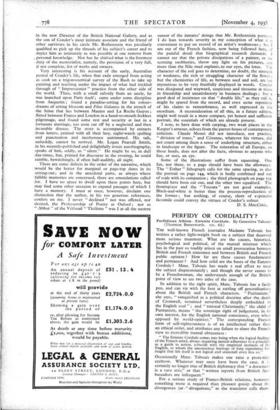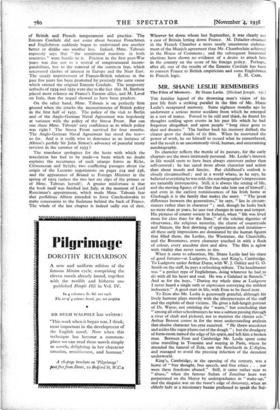PERFIDY OR. CORDIALITY?
THE well-known French journalist Madame Tabouis has
written a rather light-weight book on a subject that deserved more serious treatment. What are the causes, historical, psychological and political, of the mutual mistrust which has in the past so readily arisen on small provocation between British and French statesmen and between British and French public opinion ? How far are these causes fundamental and permanent ? And how solid are the bases of the Entente Cordiale ? Mme. Tabouis has made a real effort to treat the subject dispassionately ; and though she never ceases to be a Frenchwoman, she understands enough of the British point of view to see two sides of the case.
In addition to the right spirit, Mme. Tabouis has a facile pen, and can vie with the best at rattling off generalisations about the British and French characters. " Puritanism," she says, " vanquished as a political doctrine after the death of Cromwell, remained nevertheless deeply embedded in the English soul " ; and " rational Christianity," the child of Puritanism, means " the sovereign right of judgement, in its own interest, for the English national conscience, even when opposed by world-opinion." The corresponding French
form of self-righteousness is of an intellectual rather than an ethical order, and attributes any failure to share the French view to. incredible mental obtuseness :
" The Entente Cordiale comes into being when the logical findings of the French mind, always requiring mental adherence to a principle as a guide to action, coincide with the empirical instincts of the English, to whom the unconscious heritage of long experience haQ taught that life itself is not logical and statecraft even less so."
Occasionally Mme. Tabouis makes one raise a proteitin
eyebrow. Whatever may once have been the case, it certainly no longer true of British diplomacy that " a document is a rara avis," or that " written reports from British Am- bassadors are infrequent."
For a serious study of Franco-British relations, however, something more is required than pleasant gossip about th- divergences- (er -"-divagations,." as the translator calls them.
of British and French temperament and practice. -17ie Entente Cordiale did not come about because Frenchmen and Englishmen suddenly began to understand one another better or dislike one another less. Indeed, Mine. Tabouis expressly says that -" the sentirhental- reactions in both countries " were hostile to it. Friction in the first post-War years was due not to a revival of temperamental incom- patabilities, but to the removal of the common fear, which uncovered clashes of interest in Europe and the Near East. The steady improvement of Franco-British relations in the past five years has been promoted by precisely the- same cause which created the original Entente Cordiale. The temporary setbacks of 1934 and 1935 were due to the fact that M. Barthou placed more reliance on France's Eastern allies, and M. Laval on Italy, than the sequel showed to have been prudent.
On the other hand, Mine. Tabouis is on perfectly firm ground when she attacks the inconsistencies of British policy in the first half of 1935. The policy of the visit to Berlin and of the Anglo-German Naval Agreement was hopelessly at variance with the policy of the Stresa Front. But can one share Mme. Tabouis' easy confidence as to which policy was right ? The Stresa Front survived for four months. The Anglo-German Naval Agreement has stood the test— so far. And is it really wise to denounce as an instance of Albion's perfidy Sir John Simon's advocacy of peaceful treaty revision in the summer of 1933 ?
The translator apologises for the haste with which the translation has had to be made—a haste which no doubt explains the recurrence of such strange forms as Riau., Clemenceau and Syeyes, two conflicting passages about the origin of the Locarno negotiations on pages 224 and 236, and the appearance of Briand as Foreign Minister in the spring of 1919 (unless the two last are slips of the printer or of Mme. Tabouis herself). A greater misfortune is that the book itself was finished last July, at the moment of Lord Runciman's appointment, which made Mine. Tabouis fear that perfidious Albion intended to force Czechoslovakia to make concessions to the Sudetens behind the back of France. The whole of the last chapter is indeed sadly out of date.
Whoever -let down whom last September, it was dearly not a case of Britain letting down France. M. Daladier obtained in the French Chamber a more nearly unanimous endorse- ment of the Munich agreement than Mr. Chamberlain achieved in the House of Commons ; and the subsequent Senatorial elections have shown no evidence of a desire to attack him in the country, on the score of his foreign policy.. Perhaps, after all, one of the results of the Entente Cordiale has been to convert France to British empiricism and some Englishmen











































 Previous page
Previous page